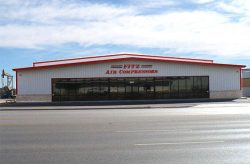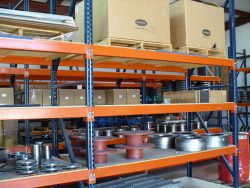The Importance of Keeping Your Air Compressor Cool
Investing in your equipment is a must for any successful business in the industrial and manufacturing sector. Low-quality or damaged equipment can lead to downtime, substandard craftsmanship and wear and tear, which eat up your bottom line and negatively impact customer satisfaction and your operations. Your team should work with quality tools and equipment and know how to maintain them.
Your air compressor can be prone to overheating. When left unchecked, this could lead to several short and long-term issues with your compressor.
Here’s what you should know about air compressor cooling and ensuring your air compressor always operates at its best.
How Does My Air Compressor Work?
Air compressors force air into its tank to create pressurized air. Inside the compressor, air is stored as potential energy. It is then released through a small opening, creating kinetic energy with many applications.
Most air compressors typically have a pump cylinder, a piston and a crankshaft. These are typically found in operating tools and air pumps. Air compressors are also used in other air-powered machines, air conditioning units, pneumatic tools, manufacturing and other applications for industrial air compressors.
What Temperature Is Ideal for My Air Compressor?
Ideally, the air compressor’s room temperature should be 50 to 85 degrees Fahrenheit. Depending on the air compressor’s manufacturer, air compressors can withstand as high as 105 to 110 degrees for air-cooled compressors.
You should also consider the air compressor temperature through the discharge line. It should be around 185 to 190 degrees Fahrenheit. At about 220 to 230 degrees, your device may activate its built-in auto-shut function. If it continues, there may be an issue with the auto switch. Overuse of your air compressor in high temperatures could lead to damage.
What Are the Signs of Overheating?
Air compressor temperature can affect its quality and performance, so it’s highly recommended not to use it while overheating. When not in use, your air compressor should be kept in a room that isn’t prone to extreme temperature changes.
However, if you continue to use an air compressor while it’s overheating, the following could happen:
- Automatic Shut-Off: Most air compressors have an automatic shutdown feature when they reach around 220 to 230 degrees Fahrenheit.
- Reduced Performance: It can take a while for your air compressor to reach full operating capacity as it could be functioning more demanding than usual. You may also notice that your air compressor needs additional rest time.
- Emitting an Odd Smell: Compressors that work with coolants could have a refrigerant leak. If it smells like burnt rubber, it could be an issue with the oil or a sign that some of the parts of your air compressor could be overheating.
- Trip Circuit Breaker: If your breaker’s capacity can handle the air compressor’s amperage, this could be a sign that your motor is using too much power. This suggests that it’s working harder than it should to operate.
Compressor Failing To Turn On: An issue with its fuse or motor may permanently break your air compressor or require industrial air compressor repairs from a professional.
Why Is My Air Compressor Overheating?
Your air compressor will typically heat up because of factors like friction and its motor. However, if your air compressor temperature gets too hot, it could indicate something is wrong. Left unchecked, it could result in avoidable damage as the extra power could wear out parts of your air compressor, such as your motor.
- Clogged Air Compressor Cooling: Your air compressor’s cooling system may have accumulated too many dirt particles that are affecting the flow of its cooling system. Check if there is any impacted dirt within the openings. If you still have an overheating problem, the internal part of the cooling system may be clogged.
- Broken Air Dryer Drain: Your air compressor may be attached to an air dryer, which should reduce the moisture in your compressed air. The refrigerant cools the air, so when the air dryer is clogged or broken, it might not function properly, leading to a higher inlet temperature.
- Overflowing Condensate Separators: Air compressors use separators to filter the condensate as water from the oil. Depending on how often you use your air compressors, you should change the coalescing filters when they take on too much dirt or during maintenance.
- Low Oil Level: Insufficient oil in your air compressor could affect the cooler’s flow, leading to overheating issues. Ensure your equipment has enough oil before operating.
- Needs Oil Change: Oil can absorb heat, but over time, it reduces its quality until it can no longer perform as well as it did. Reciprocating compressors should get an oil change after around 500 to 1,000 hours of use, while rotary screw compressors should be changed every 2,000 to 8,000 hours. If you smell burnt oil or rubber and hear unusual sounds coming from your air compressor, check if it’s time for an oil change.
- Clogged Inlet Filter: All air compressors have an automatic feature that shuts itself down when it reaches a certain low or high-pressure level. When your inlet filter is blocked, it could require your motor to work harder, increasing the pressure and triggering the automatic shutdown.
How Do I Prevent Overheating My Air Compressor?
It’s normal for your air compressor to feel warm to the touch during use because of the friction. However, leaving it to overheat for long periods could lead to long-term issues and wearing your compressor’s parts faster.
Like any equipment, your air compressor has a definite lifespan. One way of maximizing its lifespan is by preventing overheating your equipment through various ways, including:
- Routine Maintenance: Maintenance should be done once or twice a year or after two thousand hours, whichever comes first. Have a professional provide comprehensive air compressor maintenance to keep your machine running at its best.
- Install Air Conditioning Systems: Some air compressor cooling systems use room temperature to minimize overheating. Installing air conditioning systems in indoor spaces can keep your areas within the ideal temperature of 50 to 85 degrees Fahrenheit.
- Regulate Indoor Temperature: If air conditioners are not an option, at least keep the room temperature below 85 degrees. Using fans and improving your ventilation system can create consistent airflow, reducing temperature and humidity indoors.
- Check Oil Levels and Air Filters: Ensure that your air compressor’s oil levels are normal before using your air compressor. Check if your oil needs to be changed by observing if the oil is too watery. Also, check for any visible blockages in the air filters.
Alternately, you should also be careful of extremely cold temperatures, which could also damage your air compressor.
Am I Using the Right Air Compressor?
Air compressors have many applications in industrial, manufacturing and other sectors. With different air compressor brands and models, you must ensure your chosen unit is compatible with your demands and applications. Otherwise, issues such as overheating or wear and tear may appear earlier than your equipment’s typical lifespan.
The best way to tell if you’re using a suitable air compressor is by consulting a professional. Whether you’re in the market for a Gardner Denver Air Compressor or any other industrial air compressor brand, the team at Fitz Equipment is more than happy to discuss your needs and recommend the most suitable unit for your operations.
There are several factors to consider when choosing your air compressor. These include the following:
- Air Capacity: A good rule of thumb is to calculate the cubic feet per minute (CFM) your shop needs. Add all the CFM of the tools and equipment you will be using simultaneously (you can find it on the device or in its manual), and then add 30% for some allowance.
- Service Provider: All air compressors, like any equipment in your business, require maintenance. Let a professional handle this to maximize your compressor’s performance and lifespan, especially when repairs are needed. Ideally, where you source your compressor should also provide maintenance, replacement and repair services.
- Oiled or Lubricated Air Compressors: Factors like the unit’s price could affect your decision, and lubricated compressors are more expensive. However, lubricated compressors are recommended for warmer temperatures.
- Thermal Protection: If you want to avoid the risks of overheating, choose units with thermal protection systems. This includes features like auto shutdowns when the compressor gets too hot.
Quality Industrial Equipment and Services at Fitz Equipment
Choose high-quality industrial equipment from a provider you can trust. At Fitz Equipment, we are authorized distributors of dependable air compressor brands such as Gardner Denver, Kaeser, Portable Air Inc. and more. We also provide maintenance services and reliable 24-hour on-call repair and replacement service every day of the year.
With over 50 years of outstanding experience and service to local and international industries, Fitz Equipment is the team you can trust to deliver equipment that becomes valuable assets to your operations. Your satisfaction is our top priority, and we take steps to ensure our top-notch products and reliable services are delivered promptly.
Minimize your operation’s downtime with top-quality industrial products at competitive prices. Contact our team today to receive a quote on our products and services.




